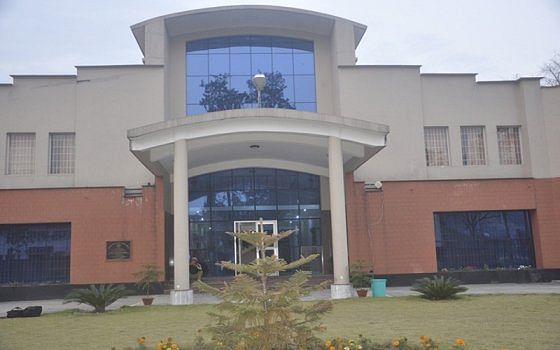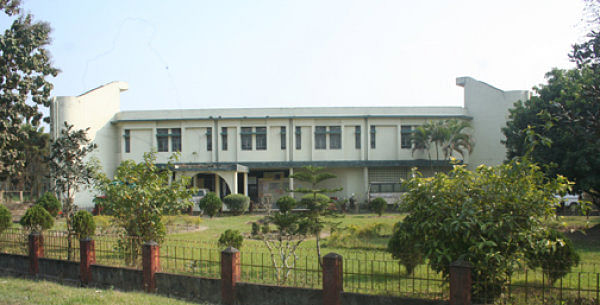M.Sc Forestry Syllabus and Subjects

The main objective of the M.Sc. in Forestry programme is to deliver scholarly and practical knowledge in the forestry industry. The management of forests, tree plantations, and related natural resources is one of the topics addressed in this course. The course assists the students in comprehending the numerous functions of forests, how to preserve them, and how to prevent their destruction. The M.Sc. Forestry syllabus is listed below.
Semester Wise M.Sc. Forestry Syllabus
Among the popular forestry specialisations that people can study at the master's level are Forest Economics, Forest Management, Commercial Forestry, Wildlife Science, and Wood Science & Technology. These topics are all included in the M.Sc. Forestry programme. Four semesters and a variety of topics are covered in the M.Sc. Forestry programme. The M.Sc. Forestry courses that are offered each semester are listed below:
M.Sc. Forestry First Year Syllabus
The table below contains the list of M.Sc. Forestry subjects in the first year:
| Semester I | Semester II |
| Advanced Silviculture | Wood Science and Technology |
| Forest Biometric | Medicinal and Aromatic Plants |
| Tree Breeding | Plantation Technology |
| Wood-based industries | Watershed Management |
| Wildlife Management | Eco-Tourism |
| Forest Protection | Forest Genetic Resources |
M.Sc. Forestry Second Year Syllabus
The table below contains the list of M.Sc. Forestry subjects in the first and second year:
| Semester III | Semester IV |
| Forest products – chemistry and industries | Tree Improvement |
| Forest ecology and biodiversity conservation | Forests and People |
| Forest resource management and economics | Computer Application and Information Technology |
| Forest protection | Remote Sensing and Geographic Information System |
| Forest policy and laws and international conventions | General Statistical Methods and Research Methodology |
M.Sc. Forestry Subjects
Over the course of two years, M.Sc. Forestry courses cover a wide range of subjects and topics that are crucial for prospective students to study. Core and elective categories are used to categorise the subjects for the M.Sc. Forestry programme. A list of M.Sc. Forestry courses are provided below:
M.Sc. Forestry Core Subjects
The core M.Sc. Forestry subjects list of essential subjects that all M.Sc. Forestry student's study is as follows:
- Principle of civil culture
- Introduction to forest soil science
- Professional communication
- Environmental studies I
- Fundamentals of Extension Education
- Forest mensuration
- Human development
- Surveying
- Forest ecology
- Principles of forest soil sciences
- Dendrology
- Cytology
- Elementary Mathematics
- Agro Meteorology
- Introduction to Tree Science
- Tree Seed Technology
- General Biochemistry
- Physical Education
- Computer Applications
- General forest microbiology
- Forest Entomology
- Environmental Studies II
- Forest Management
Practical:
- Practical Session
- Seminar
- Internship
- Project Work
M.Sc. Forestry Elective Subjects
- Electronic System Design
- Tree Biology and Arboriculture
- Ethics, Environment and Society
- Tropical Forests, People and Policies
- Applied Ethnobotany
- Biodiversity in Urban Nature
- Behavioural and Experimental Economics
- Planning Interdisciplinary Research
- Conflict Analysis and Negotiation Design
- Biodiversity in Managed Forests
- Silviculture of Temperate Forests
M.Sc. Forestry Course Structure
Core and elective courses are frequently offered in M.Sc. Forestry programmes. Core subjects take up the first few semesters of the Forestry and Wildlife programme. Depending on the Forestry and Wildlife programme, it may take up to one academic year to finish the core curriculum.
After that, candidates have the option of customising their second-year Forestry programme by choosing electives based on their post-Forestry and Wildlife employment goals. Students might decide to specialise in various fields of The management of forests, tree plantations, and related natural resources courses and concentrations.
The topics included in the M.Sc. Forestry programmes provide not just theoretical understanding but also vital interpersonal and practical abilities. The M.Sc. Forestry course structure is broken down as follows:
- IV Semesters
- Core Courses
- Elective Courses
- Practicals
- Seminars
- Internship
- Project Work
M.Sc. Forestry Teaching Methodology and Techniques
The M.Sc. Forestry programme uses their own set of instructional strategies. Practical lessons are used to teach subjects so that students can understand what is being taught to them. Various teaching methods are employed by various M.Sc. programmes. In order to improve the effectiveness of training, M.Sc. Forestry uses case studies, group projects, and other types of action-based learning in addition to conventional lecture-based instruction.
This results in learning more about the course's theory and application. The different teaching methods applied in the M.Sc. Forestry programmes are as follows:
- Practical /Project sessions
- Internship
- Seminars
- Regular Lectures
M.Sc. Forestry Course Projects
The M.Sc. Forestry programme emphasises group projects and activities through project-based learning, which is a prevalent teaching technique. As they move through the course, groups of six to eight students each work on assignments and other duties relevant to the course. Working on projects is largely used to make sure that pupils fully grasp the principles. Some of the most popular M.Sc. Forestry projects include the following:
- Forest Economics
- Forest Management
- Commercial Forestry
- Wildlife Science
- Wood Science & Technology
- Deforestation
M.Sc. Forestry Course Books
The M.Sc. Forestry books provide students with a fundamental overview of the course as well as an in-depth study of their area of concentration. The course textbooks are available to students both online and offline. And carefully reviewing the course prerequisites by obtaining the course details before enrolling in the course, students can make an informed choice. The reference texts for the M.Sc. Forestry curricula are as follows:
| Name of Book | Author |
| Introduction to Forestry Science | De Vere Burton |
| Forestry: Principles and Applications | Antony Joseph Raj, S.B. Lai |
| Forestry: A Subjective Guide for IFS Aspirants | K.T. Parthiban, S.Umesh Kanna, S.Vennila, I.Sekar |
| Indian Forestry: A Breakthrough Approach to Forest Service | K. Manikandan, S. Prabhu |
| Continuous Cover Forestry | Timo Pukkala, Klaus Von Gadow |
| Planning For Forest Resources and Bio-Diversity Management | Kailash Chandra Bebarta |
| Forest Resources & Sustainable Development | Kailash Chandra Bebarta |
| Handbook of Forest Ecology and Biology | Sharad Singh Negi |
| Dictionary of Forestry & Wildlife Science | Kailash Chandra Bebarta |
| Farm Forestry in India – An Economics and Environmental Analysis | Dr. S.Puttaswamaiah |
























